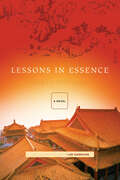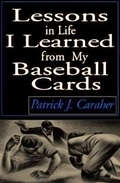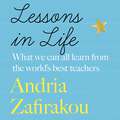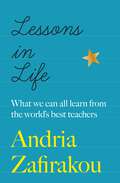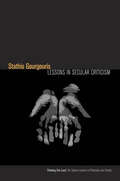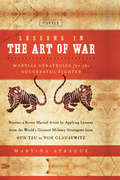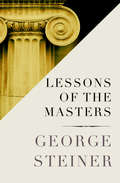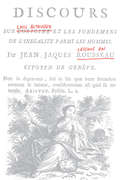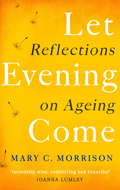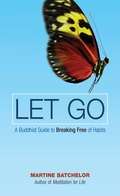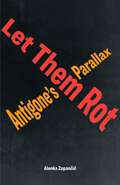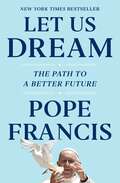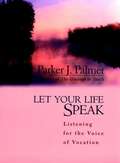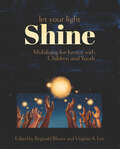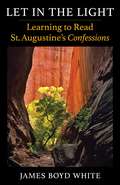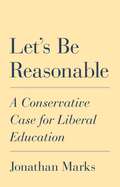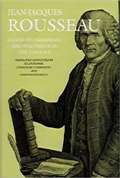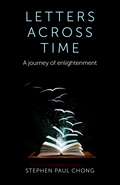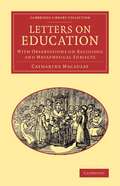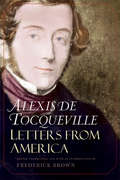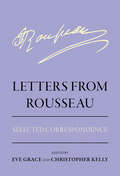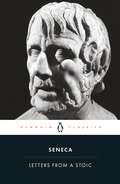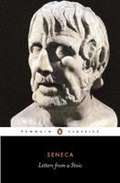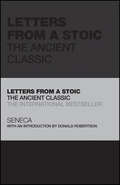- Table View
- List View
Lessons in Essence: A Novel
by Dana StandridgeImbued with the tension of Taipei and the beauty of mountain seclusion, Lessons in Essence uncovers timeless human truths in the crises faced by an honest and vulnerable manTeacher Li is a grumbling Taiwanese master of ancient Chinese arts who suffers constant nightmares about a military takeover of Taiwan by China. His family is in New York seeking U.S. citizenship when Teacher Li has an almost accidental sexual encounter with a student. Knowing everything, his wife returns to Taipei. Miserable, but finding no solace in the city, Teacher Li retreats to the mountains like the Zen hermits of old to write a book about aesthetics. But the purity he seeks is elusive even in mountain exile—he finds a rotting house for shelter, and for company the contrary Dr. Gao and his dropout student lover. Their cynicism juxtaposes Teacher Li's innocence as New York is attacked on September 11, Taiwan's president is shot in an assassination attempt, and the poles of the world seem to shift.With keen insight into human nature, subjects as diverse as erotic paintings, Virginia Woolf's punctuation, and the casual savagery of children, Dana Standridge delivers a powerful story from a complex time in history.
Lessons in Life I Learned from My Baseball Cards
by Patrick J. CaraherRemember when the most exciting moment of your childhood was opening a fresh pack of baseball cards? How you gazed lovingly at the pictures of your heroes, pored over their statistics, thrilled to their exploits and identified with their lives? We all know someone whose baseball card collection was the most significant touchstone of his childhood. Baseball card collector Patrick Caraher has turned his lifelong passion into a spiritual odyssey in Lessons in Life I Learned from Baseball Cards. Selecting some prize items from his collection, Caraher has reflected on their larger resonance and produced this little gem of a book, the sports equivalent of Everything I Need to Know I Learned in Kindergarten. With deft cameos of stars whose admirable lives and careers characterized such virtues as fortitude, humility, determination, honesty, and decency, Caraher has breathed life into the statistics behind baseball's role models and produced a collection of miniature portraits that illuminates the national pastime as few other books have.
Lessons in Life: What we can all learn from the world’s best teachers
by Andria ZafirakouOne of the world's best teachers discovers from other award-winning teachers what they have come to understand about children.What can the best teachers in the world tell us about our children? What advice can they give to help us raise happy, confident and caring kids? Teachers spend a lot of time with their pupils - talking and listening to them, observing and guiding them. What can we learn from teachers about helping kids become compassionate, contented and successful grown-ups, as well as conscientious global citizens? In Lessons in Life, Andria Zafirakou - the 2018 Global Teacher Prize winner - talks to 30 of the best teachers in the world willing to share their insight and wisdom, gained from years of working with children of all ages.They include:Ranjitsinh Disale (Global Teacher Prize winner 2020), a primary teacher who turned a cattle shed in the drought-prone village of Paritewadi in India into a school. His many skills include showing his pupils how to broaden their horizon, and to become advocates for change;Peter Tabichi (Global Teacher Prize winner 2019), a maths and physics teacher in the Rift Valley Province in Kenya, regularly impacted by famine, who has found a way to make his students care about their studies and believe in a future they can be part of, despite the hardship all around them.Esther Wojcicki (California Teacher of the Year 2002), a leading American teacher who challenged traditional school rules in her lessons to allow her students to take control, learn to believe in themselves and feel empowered.Andrew Moffat (MBE for services to equality in education 2017), a primary teacher in Birmingham who created a teaching resource called 'Challenging Homophobia in Primary Schools' to help his pupils understand the importance of tolerance and open-mindedness. The result is an inspiring, moving and fascinating listen that will help parents identify a child's potential and give them the tools to shine. To know what these incredible teachers know and see what they see is a privilege and a gift.(P) 2023 Quercus Editions Limited
Lessons in Life: What we can all learn from the world’s best teachers
by Andria ZafirakouWhat can the best teachers in the world tell us about our children? What advice can they give to help us raise happy, confident and caring kids? Teachers spend a lot of time with their pupils - talking and listening to them, observing and guiding them. What can we learn from teachers about helping kids become compassionate, contented and successful grown-ups, as well as conscientious global citizens? In Lessons in Life, Andria Zafirakou - the 2018 Global Teacher Prize winner - talks to 30 of the best teachers in the world willing to share their insight and wisdom, gained from years of working with children of all ages.They include:Ranjitsinh Disale (Global Teacher Prize winner 2020), a primary teacher who turned a cattle shed in the drought-prone village of Paritewadi in India into a school. His many skills include showing his pupils how to broaden their horizon, and to become advocates for change;Peter Tabichi (Global Teacher Prize winner 2019), a maths and physics teacher in the Rift Valley Province in Kenya, regularly impacted by famine, who has found a way to make his students care about their studies and believe in a future they can be part of, despite the hardship all around them.Esther Wojcicki (California Teacher of the Year 2002), a leading American teacher who challenged traditional school rules in her lessons to allow her students to take control, learn to believe in themselves and feel empowered.Andrew Moffat (MBE for services to equality in education 2017), a primary teacher in Birmingham who created a teaching resource called 'Challenging Homophobia in Primary Schools' to help his pupils understand the importance of tolerance and open-mindedness. The result is an inspiring, moving and fascinating read that will help parents identify a child's potential and give them the tools to shine. To know what these incredible teachers know and see what they see is a privilege and a gift.
Lessons in Secular Criticism (Thinking Out Loud)
by Stathis GourgourisSecular criticism is a term invented by Edward Said to denote not a theory but a practice that counters the tendency of much modern thinking to reach for a transcendentalist comfort zone, the very space philosophy wrested away from religion in the name of modernity. Using this notion as a compass, this book reconfigures recent secularism debates on an entirely different basis, by showing (1) how the secular imagination is closely linked to society’s radical poiesis, its capacity to imagine and create unprecedented forms of worldly existence; and (2) how the space of the secular animates the desire for a radical democratic politics that overturns inherited modes of subjugation, whether religious or secularist.Gourgouris’s point is to disrupt the co-dependent relation between the religious and the secular—hence, his rejection of fashionable languages of postsecularism—in order to engage in a double critique of heteronomous politics of all kinds. For him, secular criticism is a form of political being: critical, antifoundational, disobedient, anarchic, yet not negative for negation’s sake but creative of new forms of collective reflection, interrogation, and action that alter not only the current terrain of dominant politics but also the very self-conceptualization of what it means to be human.Written in a free and combative style and given both to close readings of texts and to gazing off into the broad horizon, these essays cover a range of issues—historical and philosophical, archaic and contemporary, literary and political—that ultimately converge in the significance of contemporary radical politics: the assembly movements we have seen in various parts of the world in recent years. The secular imagination demands a radical pedagogy and unlearning a great many established thought patterns. Its most important dimension is not battling religion per se but dismantling theological politics of sovereignty in favor of radical conditions for social autonomy.
Lessons in the Art of War
by Martina SpragueWar is a human activity, not one that is limited by geographic location. And the principles of war are the same, regardless of place or number of participants. An army of ten thousand engaged in battle uses the same basic strategies that two people in single combat will utilize.In Lessons in the Art of War, author Martina Sprague explores the writings of both Sun Tzu, the famous Chinese military strategist, and Carl von Clausewitz, the European military genius. Despite the differences in time period, geographic location and culture, both Sun Tzu and von Clausewitz had achieved extraordinary understanding of human nature and how that relates to combat. Sprague takes the similarities and differences in their respective strategies and distills them down to their essence for martial artists to understand and incorporate into their personal practices.
Lessons in the Art of War
by Martina SpragueWar is a human activity, not one that is limited by geographic location. And the principles of war are the same, regardless of place or number of participants. An army of ten thousand engaged in battle uses the same basic strategies that two people in single combat will utilize.In Lessons in the Art of War, author Martina Sprague explores the writings of both Sun Tzu, the famous Chinese military strategist, and Carl von Clausewitz, the European military genius. Despite the differences in time period, geographic location and culture, both Sun Tzu and von Clausewitz had achieved extraordinary understanding of human nature and how that relates to combat. Sprague takes the similarities and differences in their respective strategies and distills them down to their essence for martial artists to understand and incorporate into their personal practices.
Lessons of the Masters (The\charles Eliot Norton Lectures #51)
by George SteinerA thought-provoking examination of the complex teacher-student relationship, from one of the great minds of the modern literary worldBased on George Steiner&’s extensive experience as a teacher, Lessons of the Masters is a passionate examination of the &“profession of the professor.&” He writes about what empowers one person to teach another, and explores the complexities and nuances of this bond. From the charismatic master to the loving disciple, Steiner explores the religious, philosophical, economic, and scientific aspects of imparting knowledge, drawing upon history&’s most famous teachers: Socrates, Jesus, Faust, Virgil, Dante, Heloise, and Abelard.
Lessons on Rousseau
by Louis AlthusserAlthusser dissects the leading Enlightenment philosopherAlthusser delivered these lectures on Rousseau's Discourse on the Origins of Inequality at the École normale supérieure in Paris in 1972. They are fascinating for two reasons. First, they gave rise to a new generation of Rousseau scholars, attentive not just to Rousseau's ideas, but also to those of his concepts that were buried beneath metaphors or fictional situations and characters. A new way of coming to terms with Rousseau's theoretical rigour, beneath his apparent reveries and sentimental flights of fancy, was here put to work. Second, we are now discovering that the 'late Althusser's' theses about aleatory materialism and the need to break with the strict determinism of theories of history in order to devise a new philosophy 'for Marx' were being worked out well before 1985 - in this reading of Rousseau dating from twelve years earlier, which introduces into Rousseau's text the ideas of the void, the accident, the take, and the necessity of contingency.
Let Evening Come: Reflections on Ageing
by Mary C. Morrison'Incredibly wise, comforting and beautiful' - Joanna LumleyIt is never too soon to start thinking about old age. In Let Evening Come, Mary C. Morrison, herself eighty-seven at the time of first publication, considers the gains and losses of the ageing process in all their depth and richness. She writes about old age from her own personal experience, describing without sentimentality or despair how it actually feels to grow old, to be old, to look back over life, to look forward to death. In a series of meditative passages and journal entries she presents old age as a time that calls for gallantry and courage, but one that also offers unique opportunities for inner growth and wisdom.Let Evening Come is a remarkable book; simply but elegantly written, it is both moving and uplifting. It is not only for those standing on the edge of old age, it is for people of all ages, and once read will be recommended to others for the very special pleasures found within its pages.
Let Go
by Martine BatchelorWhen we break free from the habits that limit us, a new world of possibilities opens up. In Let Go, Martine Batchelor leads the way there. Negative patterns of mind may manifest as fear, avoidance, depression, addiction, judgment of self or other, and any of a host of other physical, mental, or psychological forms. Let Go aims at understanding what really lies at the root of these behaviors so we can reclaim control. Each chapter concludes with an exercise or guided meditation as a tool for the reader to work with negative habits in new and creative ways. You don't have to be a Buddhist for them to work. You just need to want to move on. Helpful exercises and guided meditations - designed to build understanding of our negative habits, as well as the confidence and skill needed to instead embrace our greatest qualities - appear throughout the book. Batchelor also looks at Mindfulness-Based Cognitive Therapy (MBCT) for depression, Dr. Jeffrey Schwartz's use of meditation to deal with Obsessive-Compulsive Disorder (OCD), successful combinations of meditation and Twelve-Step programs, and offers her own innovations.
Let Them Rot: Antigone’s Parallax (Idiom: Inventing Writing Theory)
by Alenka ZupančičA provocative, highly accessible journey to the heart of Sophocles’ Antigone elucidating why it keeps resurfacing as a central text of Western thought and Western culture.There is probably no classical text that has inspired more interpretation, critical attention, and creative response than Sophocles’ Antigone. The general perspective from which the book is written could be summarized with this simple question: What is it about the figure of Antigone that keeps haunting us? Why do all these readings and rewritings keep emerging? To what kind of always contemporary contradiction does the need, the urge to reread and reimagine Antigone—in all kinds of contexts and languages—correspond? As key anchor points of this general interrogation, three particular “obsessions” have driven the author’s thinking and writing about Antigone. First is the issue of violence. The violence in Antigone is the opposite of “graphic” as we have come to know it in movies and in the media; rather, it is sharp and piercing, it goes straight to the bone. It is the violence of language, the violence of principles, the violence of desire, the violence of subjectivity. Then there is the issue of funerary rites and their role in appeasing the specific “undeadness” that seems to be the other side of human life, its irreducible undercurrent that death alone cannot end and put to rest. This issue prompted the author to look at the relationship between language, sexuality, death, and “second death.” The third issue, which constitutes the focal point of the book, is Antigone’s statement that if it were her children or husband lying unburied out there, she would let them rot and not take it upon herself to defy the decree of the state. The author asks, how does this exclusivist, singularizing claim (she would do it only for Polyneices), which she uses to describe the “unwritten law” she follows, tally with Antigone’s universal appeal and compelling power? Attempting to answer this leads to the question of what this particular (Oedipal) family’s misfortune, of which Antigone chooses to be the guardian, shares with the general condition of humanity. Which in turn forces us to confront the seemingly self-evident question: “What is incest?”Let Them Rot is Alenka Zupančič’s absorbing and succinct guided tour of the philosophical and psychoanalytic issues arising from the Theban trilogy. Her original and surprising intervention into the broad and prominent field of study related to Sophocles’ Antigone illuminates the classical text’s ongoing relevance and invites a wide readership to become captivated by its themes.
Let Us Dream: The Path to a Better Future
by Pope Francis Austen IvereighIn this uplifting and practical book, written in collaboration with his biographer, Austen Ivereigh, the preeminent spiritual leader explains why we must—and how we can—make the world safer, fairer, and healthier for all people now.In the COVID crisis, the beloved shepherd of over one billion Catholics saw the cruelty and inequity of our society exposed more vividly than ever before. He also saw, in the resilience, generosity, and creativity of so many people, the means to rescue our society, our economy, and our planet. In direct, powerful prose, Pope Francis urges us not to let the pain be in vain. He begins Let Us Dream by exploring what this crisis can teach us about how to handle upheaval of any kind in our own lives and the world at large. With unprecedented candor, he reveals how three crises in his own life changed him dramatically for the better. By its very nature, he shows, crisis presents us with a choice: we make a grievous error if we try to return to some pre-crisis state. But if we have the courage to change, we can emerge from the crisis better than before. Francis then offers a brilliant, scathing critique of the systems and ideologies that conspired to produce the current crisis, from a global economy obsessed with profit and heedless of the people and environment it harms, to politicians who foment their people&’s fear and use it to increase their own power at their people&’s expense. He reminds us that Christians&’ first duty is to serve others, especially the poor and the marginalized, just as Jesus did. Finally, the Pope offers an inspiring and actionable blueprint for building a better world for all humanity by putting the poor and the planet at the heart of new thinking. For this plan, he draws not only on sacred sources, but on the latest findings from renowned scientists, economists, activists, and other thinkers. Yet rather than simply offer prescriptions, he shows how ordinary people acting together despite their differences can discover unforeseen possibilities. Along the way, he offers dozens of wise and surprising observations on the value of unconventional thinking, on why we must dramatically increase women&’s leadership in the Church and throughout society, on what he learned while scouring the streets of Buenos Aires with garbage-pickers, and much more. Let Us Dream is an epiphany, a call to arms, and a pleasure to read. It is Pope Francis at his most personal, profound and passionate. With this book and with open hearts, we can change the world.
Let Your Life Speak: Listening For The Voice Of Vocation
by Parker J. PalmerWith wisdom, compassion, and gentle humor, Parker J. Palmer invites us to listen to the inner teacher and follow its leadings toward a sense of meaning and purpose. Telling stories from his own life and the lives of others who have made a difference, he shares insights gained from darkness and depression as well as fulfillment and joy, illuminating a pathway toward vocation for all who seek the true calling of their lives.
Let Your Light Shine: Mobilizing for Justice with Children and Youth
by Marian Wright Edelman Shannon Daley-Harris Gregory C. Ellison II Ched Myers Patrick B. Reyes Janet Wolf Reginald Blount Virginia A. Lee Eileen Lindner Lorena M. ParrishChildren face too many tough situations today: broken immigration policies, hunger, school shooting, mass incarceration, human trafficking, failing schools, child soldiers in wars worldwide. Despite the harsh realities, there is still hope! And YOU can play a vital role in keeping that hope alive! Let Your Light Shine challenges readers to engage in their own work of justice for and with children. Inspired by the contributions of leaders like Marian Wright Edelman, founder of the Children’s Defense Fund, the authors present ways to engage in works of justice that offer life, meaning, and hope to our children and youth.
Let in the Light: Learning to Read St. Augustine's Confessions
by James Boyd WhiteSt. Augustine’s Confessions is heralded as a classic of Western culture. Yet when James Boyd White first tried to read it in translation, it seemed utterly dull. Its ideas struck him as platitudinous and its prose felt drab. It was only when he started to read the text in Latin that he began to see the originality and depth of Augustine’s work.In Let in the Light, White invites readers to join him in a close and engaged encounter with the Confessions in which they will come to share his experience of the book’s power and profundity by reading at least some of it in Augustine’s own language. He offers an accessible guide to reading the text in Latin, line by line—even for those who have never studied the language.Equally attuned to the resonances of individual words and the deeper currents of Augustine’s culture, Let in the Light considers how the form and nuances of the Latin text allow greater insight into the work and its author. White shows how to read Augustine’s prose with care and imagination, rewarding sustained attention and broader reflection.Let in the Light brings new life to a classic work, guiding readers to experience the immediacy, urgency, and vitality of Augustine’s Confessions.
Let's Be Reasonable: A Conservative Case for Liberal Education
by Jonathan MarksA conservative college professor's compelling defense of liberal educationNot so long ago, conservative intellectuals such as William F. Buckley Jr. believed universities were worth fighting for. Today, conservatives seem more inclined to burn them down. In Let's Be Reasonable, conservative political theorist and professor Jonathan Marks finds in liberal education an antidote to this despair, arguing that the true purpose of college is to encourage people to be reasonable—and revealing why the health of our democracy is at stake.Drawing on the ideas of John Locke and other thinkers, Marks presents the case for why, now more than ever, conservatives must not give up on higher education. He recognizes that professors and administrators frequently adopt the language and priorities of the left, but he explains why conservative nightmare visions of liberal persecution and indoctrination bear little resemblance to what actually goes on in college classrooms. Marks examines why advocates for liberal education struggle to offer a coherent defense of themselves against their conservative critics, and demonstrates why such a defense must rest on the cultivation of reason and of pride in being reasonable.More than just a campus battlefield guide, Let's Be Reasonable recovers what is truly liberal about liberal education—the ability to reason for oneself and with others—and shows why the liberally educated person considers reason to be more than just a tool for scoring political points.
Letter To D'Alembert And Writings For The Theater (The Collected Writings of Rousseau Volume #10)
by Jean-Jacques Rousseau Christopher Kelly Allan Bloom Charles ButterworthIn 1758, Jean Le Rond d'Alembert proposed the public establishment of a theater in Geneva--and Jean-Jacques Rousseau vigorously objected. Their exchange, collected in volume ten of this acclaimed series, offers a classic debate over the political importance of the arts. As these two leading figures of the Enlightenment argue about censorship, popular versus high culture, and the proper role of women in society, their dispute signals a declaration of war that divided the Enlightenment into contending factions. These two thinkers confront the contentious issues surrounding public support for the arts through d'Alembert's original proposal, Rousseau's attack, and the first English translation of d'Alembert's response as well as correspondence relating to the exchange. The volume also contains Rousseau's own writings for the theater, including plays and libretti for operas, most of which have never been translated into English. Among them, Le Devin du village was the most popular French opera of the eighteenth century while his late work Pygmalion is a profound meditation on the relation between an artist and his creation. This volume offers English readers a unique opportunity to appreciate Rousseau's writings for the theater as well as his attack on the theater as a public institution.
Letters Across Time: A Journey of Enlightenment
by Stephen Paul ChongLetters Across Time is an anthology of modern work and personal life that will open up deep insights into how to realise your fullest potential and achieve your life s purpose. It provides practical suggestions to enable you to improve the richness and quality of your life, yet it allows you to find your own pathway. Through the use of an irresistible story of a family of ducks their trials, tribulations and life achievements, Letters Across Time empowers you to realise your own self-worth and apply that to your chosen vocation, family, community and workplaces in which you live and prosper.
Letters On Education: With Observations On Religious And Metaphysical Subjects (Cambridge Library Collection)
by Catharine MacaulayFirst published in 1790, this collection of letters presents the mature views of Catharine Macaulay (1731-91) on education and related topics. Famed as an impassioned writer on history and politics, she defied eighteenth-century preconceptions of what it was possible and appropriate for women to achieve. Ranging across a broad spectrum of subjects, from diet and reading to pastimes, religion and discipline, this work reflects her enlightened thinking. She compares the educational situation in England to the contemporary French and American systems, and even those of ancient Rome and Sparta. Championing equality in education regardless of gender, Macaulay argues for the instruction of girls within a co-educational system, seeing this as the only way to improve female standing in society. Also reissued in this series is her eight-volume History of England (1763-83), which traces the upheavals of the seventeenth century.
Letters from America: Alexis de Tocqueville
by Alexis De Tocqueville Frederick BrownYoung Alexis de Tocqueville arrived in the United States for the first time in May 1831, commissioned by the French government to study the American prison system. For the next nine months he and his companion, Gustave de Beaumont, traveled and observed not only prisons but also the political, economic, and social systems of the early republic. Along the way, they frequently reported back to friends and family members in France. This book presents the first translation of the complete letters Tocqueville wrote during that seminal journey, accompanied by excerpts from Beaumont’s correspondence that provide details or different perspectives on the places, people, and American life and attitudes the travelers encountered. These delightful letters provide an intimate portrait of the complicated, talented Tocqueville, who opened himself without prejudice to the world of Jacksonian America. Moreover, they contain many of the impressions and ideas that served as preliminary sketches for Democracy in America, his classic account of the American democratic system that remains an important reference work to this day. Accessible, witty, and charming, the letters Tocqueville penned while in America are of major interest to general readers, scholars, and students alike.
Letters from Rousseau: Selected Correspondence (Agora Editions)
by Eve Grace Christopher KellyLetters from Rousseau is the first extensive collection of translations of Rousseau's correspondence into English in more than eighty years. Many of the letters have not been translated before, while others address substantive issues in his thought and complement his published writings. Although these letters went through the post as ordinary letters, once Rousseau became famous, he knew that they might be opened by the police and that they were very likely to be circulated and even published. Indeed, he wrote some of them with a view to their ultimate publication.Rousseau's enormous "private" correspondence extends into all periods of his life, including intimate letters to friends, letters to famous individuals, and responses to readers who posed philosophic questions to him. Thus, Eve Grace and Christopher Kelly also share his responses to readers who had been moved by his books. Further, this volume includes letters written to or about major intellectual figures, such as Diderot, Voltaire, Hume, and Mirabeau.
Letters from a Stoic: Epistulae Morales Ad Lucilium
by SenecaIlluminating writings by Stoicism's most eloquent advocate, now with a new introduction'It is philosophy that has the duty of protecting us... without it no one can lead a life free of fear or worry'For several years of his turbulent life, in which he was dogged by ill health, exile and danger, Seneca was the guiding hand of the Roman Empire. This selection of Seneca's letters shows him upholding the ideals of Stoicism - the wisdom of the self-possessed person immune to life's setbacks - while valuing friendship and courage, and criticizing the harsh treatment of slaves and the cruelties in the gladiatorial arena. The humanity and wit revealed in Seneca's interpretation of Stoicism is a moving and inspiring declaration of the dignity of the individual mind.
Letters from a Stoic: Epistulae Morales ad Lucilium
by Seneca Robin CampbellSelected from the Epistulae Morales ad Lucilium, Seneca's Letters from a Stoicare a set of 'essays in disguise' from one of the most insightful philosophers of the Silver Age of Roman literature. This Penguin Classics edition is translated from the Latin with an introduction by Robin Campbell. A philosophy that saw self-possession as the key to an existence lived 'in accordance with nature', Stoicism called for the restraint of animal instincts and the severing of emotional ties. These beliefs were formulated by the Athenian followers of Zeno in the fourth century BC, but it was in Seneca that the Stoics found their most eloquent advocate. Stoicism, as expressed in the Letters, helped ease pagan Rome's transition to Christianity, for it upholds upright ethical ideals and extols virtuous living, as well as expressing disgust for the harsh treatment of slaves and the inhumane slaughters witnessed in the Roman arenas. Seneca's major contribution to a seemingly unsympathetic creed was to transform it into a powerfully moving and inspiring declaration of the dignity of the individual mind. Robin Campbell's lucid translation captures Seneca's humour and tautly aphoristic style. In his introduction, he discusses the tensions between Seneca's philosophy and his turbulent career as adviser to the tyrannical emperor Nero. Lucius Annaeus Seneca (c.4BC - AD65) was born in Spain but was raised according to the traditional values of the republic of Rome. In AD48 he became tutor to the future emperor Nero and became his principal civil advisor when he took power. His death was eventually ordered by Nero in AD65, but Seneca anticipated the emperor's decree and committed suicide.
Letters from a Stoic: The Ancient Classic (Capstone Classics)
by Seneca Donald RobertsonDISCOVER THE ENDURING LEGACY OF ANCIENT STOICISM Since Roman antiquity, Lucius Annaeus Seneca&’s Letters have been one of the greatest expressions of Stoic philosophy. In a highly accessible and timeless way, Seneca reveals the importance of cultivating virtue and the fleeting nature of time, and how being clear sighted about death allows us to live a life of meaning and contentment. Letters from a Stoic continues to fascinate and inspire new generations of readers, including those interested in mindfulness and psychological techniques for well-being. This deluxe hardback selected edition includes Seneca&’s first 65 letters from the Richard M. Gummere translation. An insightful introduction by Donald Robertson traces Seneca&’s busy life at the centre of Roman power, explores how he reconciled his Stoic outlook with vast personal wealth, and highlights Seneca&’s relevance for the modern reader.
